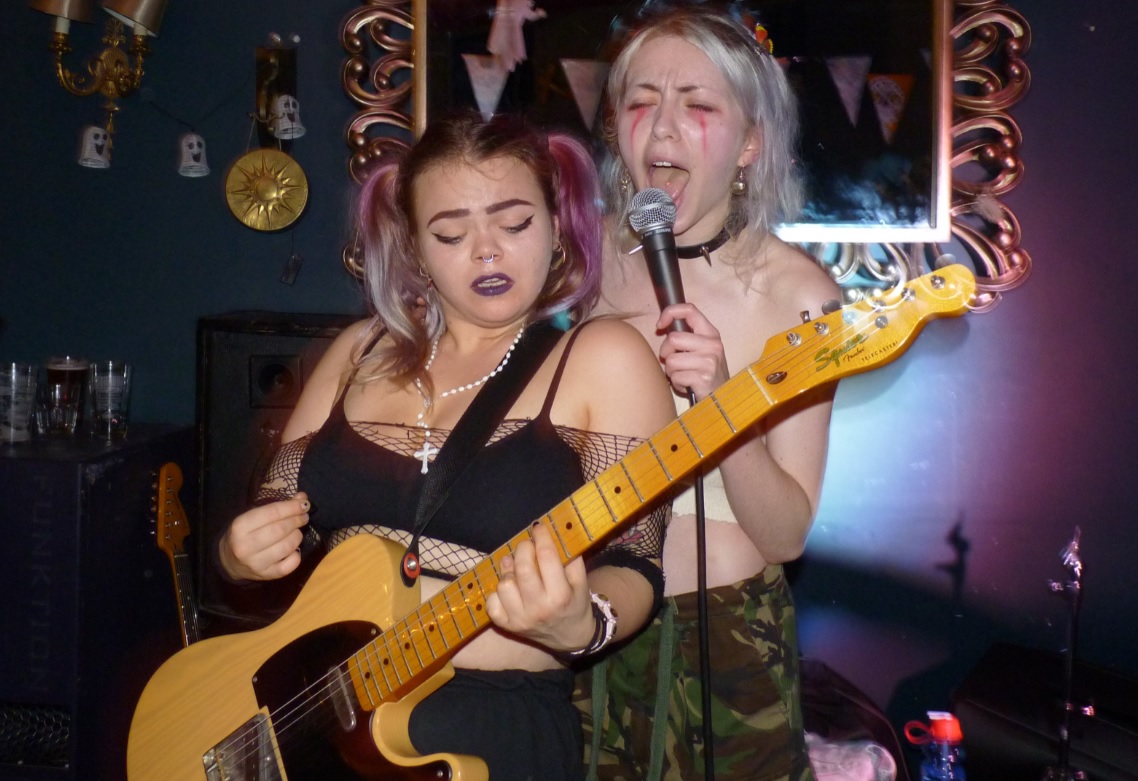 A new study carried out by guitar makers Fender has found that young women now make up half of all people starting to learn how to play the guitar in the UK and US. But as is often the case Brighton has been ahead of the trend – and for a long time!
A new study carried out by guitar makers Fender has found that young women now make up half of all people starting to learn how to play the guitar in the UK and US. But as is often the case Brighton has been ahead of the trend – and for a long time!
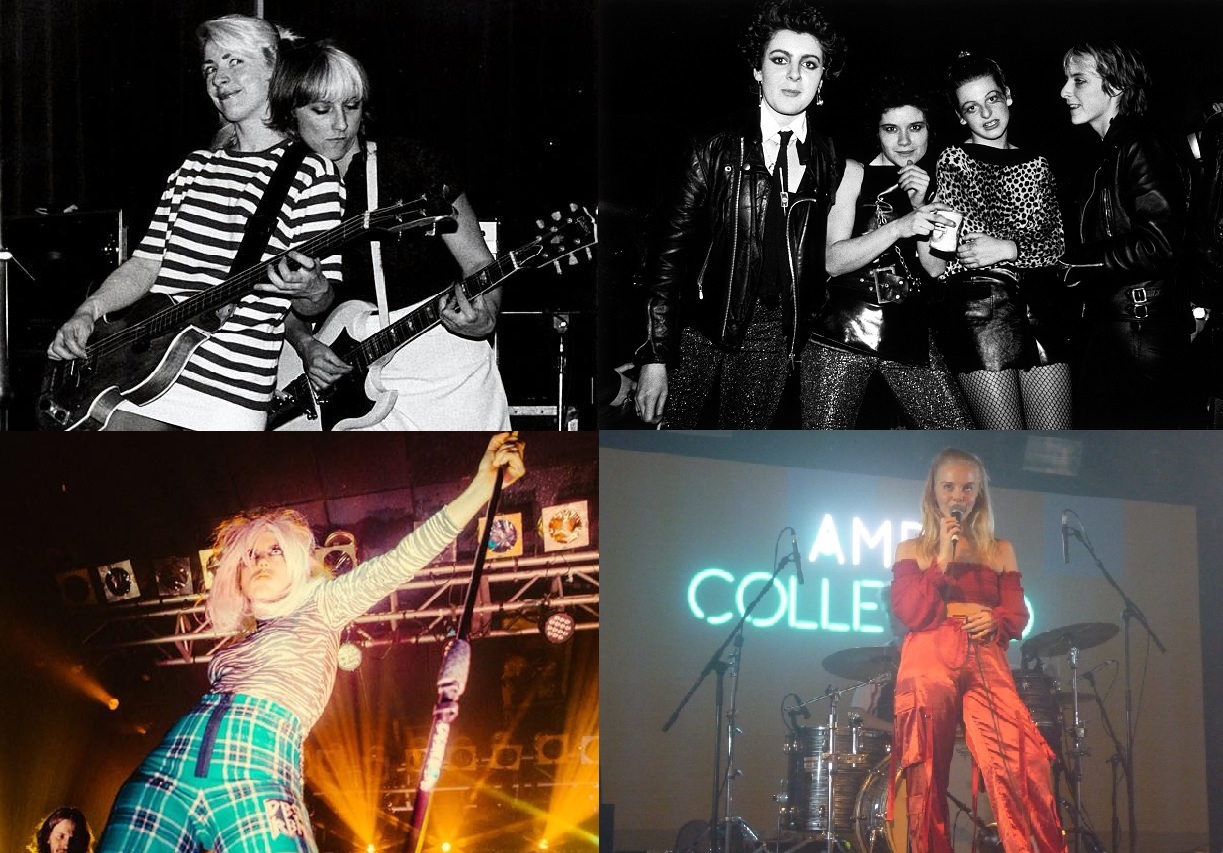
From all girl 60s beat group The Debutantes, through to Punk Rock girl bands like The Slits and the Mo-Dettes to Riot Grrrl, to today’s bands like Black Honey and Dream Wife – who played a blistering set of tunes interspersed with messages of female empowerment at the Concorde 2 this month – women have long been involved in Brighton’s music scene.
The idea of girls in bands as a gimmick has never been true in Brighton although many women have had to fight – sometimes literally – to be allowed to play and be taken seriously. Sadly, the bizarre concept that you need a cock to rock has been a difficult one to battle.
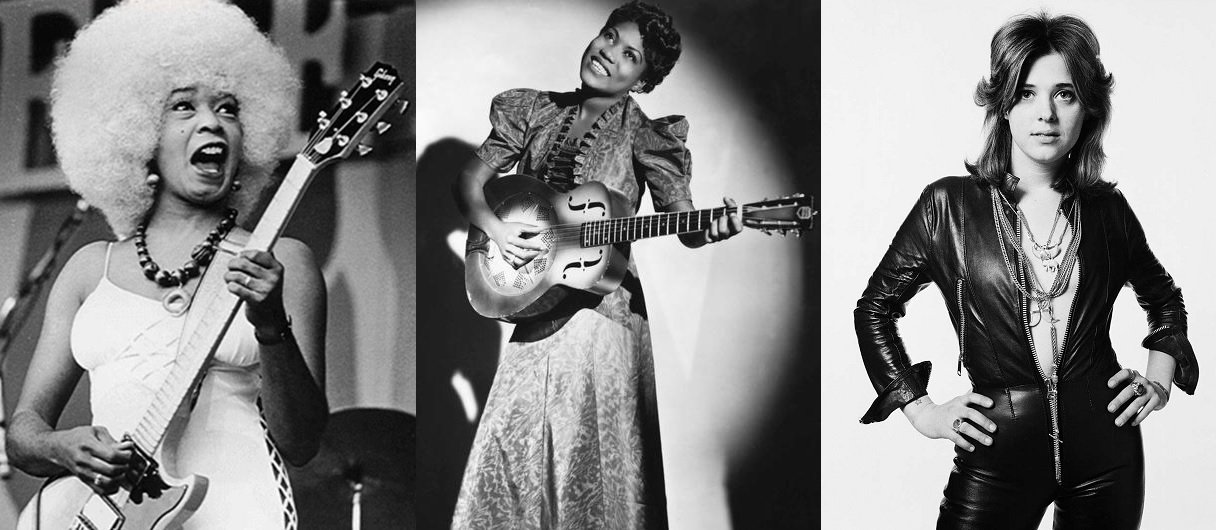
Since pop music began, women have had a prominent role as singers, but the idea of a woman playing an instrument – especially a guitar, was unthinkable in the early days. Female guitarists such as Peggy Jones, Sister Rosetta Tharpe and Suzi Quatro were regarded as exceptional by some or as novelty acts by many.
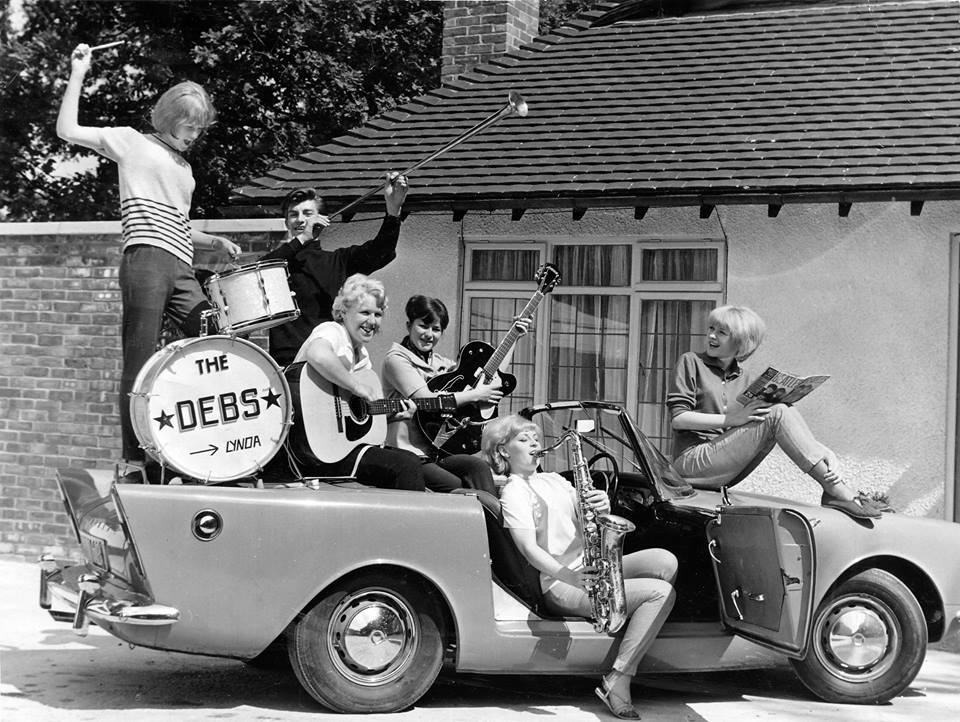
Dave and The Debutantes were an early 60s Brighton/Eastbourne beat group consisting of 5 girls and one boy. Singer Jacqueline Marsh remembers the era “In the 60’s, life as a female musician was really quite difficult. No one really thought that girls could be rockers, or really play musical instruments”.
“I spent considerable time with the girls in my band and we all felt frustrated in not being recognised for the musical ability we all had. In fact, my sister Lyn, our drummer was recognised as the best girl drummer around at the time, but this was, I think the only accolade we ever had. We spent endless days touring in our little van, travelling from one side of the country to the other, mostly I think because our Manager, Bob Gately of Beat Ballad and Blues had to book us into wherever he could get a gig, which was harder for him when trying to promote a girl band. I know in those days we all, (boys and girls) had to travel the country, trying to earn a living, but it did seem that we worked harder at being recognised. I remember once in some London dance hall, being heckled by some laddo, all I could think of was saying over the mike, “please why don’t you just shut your mouth, at least mine is earning me money!!!,” needless to say he disappeared with the rest of the audience laughing at him”.
“Life was however, easier for me as a vocalist, as people did accept that some girls could sing, but for our bass player, drummer, sax and keyboard players, it was definitely much harder to be accepted”.
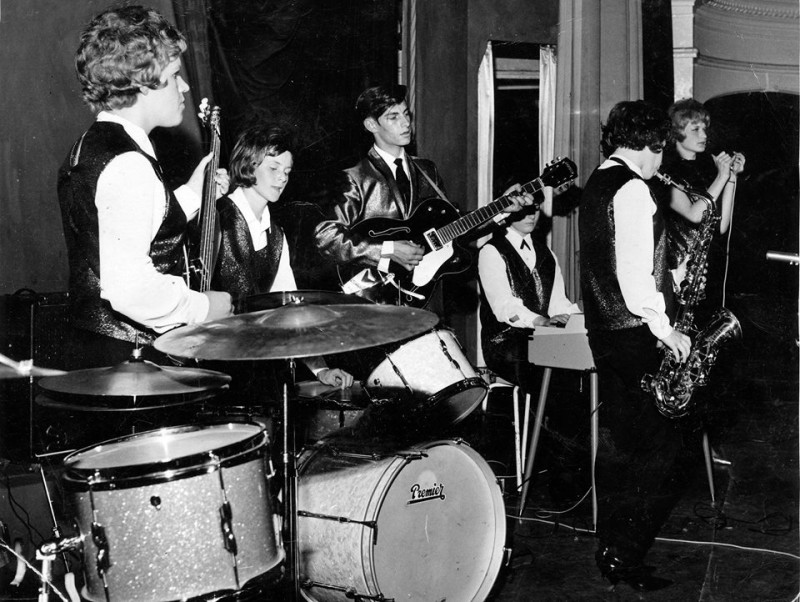
“One place that sticks in my mind however is the Flamingo Club, there the audience really enjoyed Chris, our sax players musical solos. Shouting “Hey play that Sax Girl,” so not all the audience was intolerant of female musicians”.
“Our digs were terrible and there were occasions when we slept in the van overnight, as at least our van was as clean as we could make it. Very often, travelling across the country, I would stay up to help keep Dave our driver awake, whilst the girls slept in the back of the van with the equipment. I think, it was following the death of a musician in a travelling accident that our management made us install a safety grid to prevent all the equipment flying forward when Dave had to hit the brakes. Needless to say, the girls moaned that it gave them less room to sleep”.
“We were lucky in that Dave, the only male in the band (Dave and the Debutantes) was very protective of us all and kept a close eye on the men that seemed to prey on young girls on the circuit. The promoters and bookers very often viewed us as a novelty act, a little eye candy, not recognising us as serious musicians. I am still recording now at 72, and when I look back at the era, I am glad I did it, but many of the things that went on with regards the way we were treated would not happen now due to changes in legislation and Girl Power.”
With the coming of Prog Rock and Heavy Metal in the late 60s, things got worse for women musicians rather than better, with music almost completely dominated by men. But the advent of punk in the 1970s with its “anyone can do it” ethos and opposition to sexism and racism led to women making music on equal terms with men.
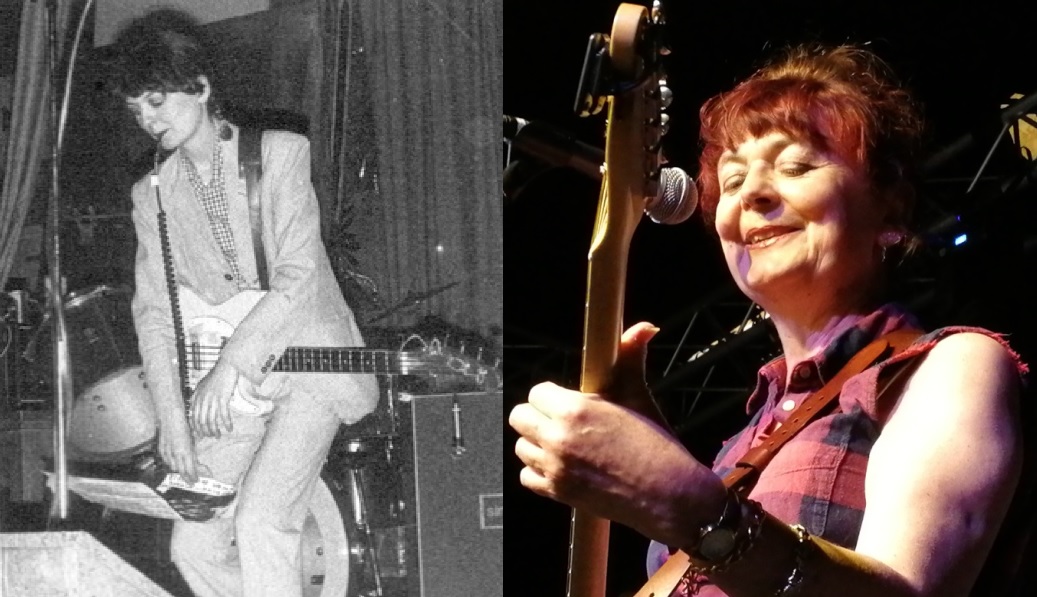
Rock historian Helen Reddington, also known to us as local musician Helen McCookerybook, states in her 2012 book “The Lost Women of Rock Music: Female Musicians of the Punk Era” – “That whilst the media image of women punk musicians was focused on the fashion aspects of the scene (fishnet stockings, mini-skirts, etc.) most women punks were more interested in the ideology and socio-political implications, rather than the fashion”.
Whilst punk fashion and music continues to have a strong influence to this day, involvement in the scene was far riskier for both genders 40 years ago.
Over to Helen again, “Brighton was a very different place in the 1970s to the way it is now; it was a very aggressive place with different gangs of young people at odds with each other, sometimes violently. Despite this there was still a thriving punk scene where it was possible for young women like me and lots of my friends to pick up basses, guitars or sit behind a drum kit and join in with making punk music”.
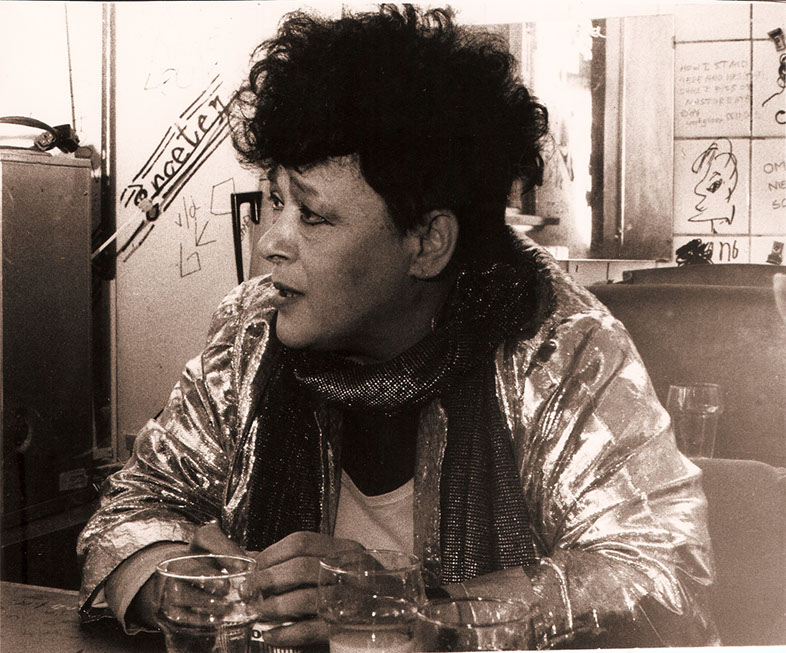
“My inspiration was Vi Subversa (the driving force behind Brighton’s first and legendary punk venue The Vault) of Poison Girls, who encouraged everyone, whether male or female. She was 40 years old and a mother and if she was doing it, what excuse did anyone else have not to? Their bass player Sue lent me her bass (which originally belonged to The Buzzcocks) and they even lent us their 14 year old drummer. Less than five years later I was a professional musician. I still can’t read music; once a punk, always a punk. It has never held me back.”
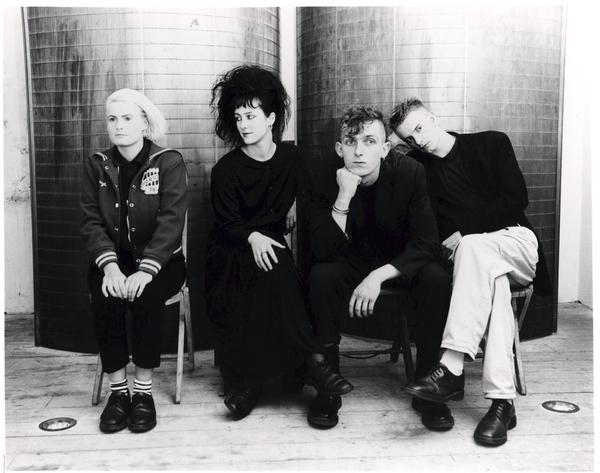
But outside of the fiercely underground punk scene, women were still not taken seriously by music industry professionals – the A&R men, the bouncers, the sound mixers. Michelle Allardyce was in several Brighton bands during the 80s– such as 4AD label artists Frazier Chorus. She recalls those days….
“When I first started playing in bands in the early 1980s I hadn’t seen many female drummers or percussionists, bassists or lead guitarists – singers and keyboard players yes. I never saw women working as sound engineers or producers in recording studios or at live gigs. You had to be pretty single-minded to work in those areas in an industry run mainly by men who didn’t take you seriously or just saw you as eye candy. You could work behind the reception desk but not the mixing desk!”
“I didn’t feel that so much when playing in bands in Brighton as people here seemed more open-minded about who could perform or create and there is a strong alternative scene here. I noticed more of an ‘attitude’ when one band I was in got signed to a major label. I was interested in learning about the preproduction and programming as well as recording and mixing, but was only tolerated in the studio if I sat quietly at the back! And I hated the constant pressure to look and act a certain way from our manager and record company – I’m sure that hasn’t changed much! I didn’t fit the look and wasn’t interested in ‘fame & fortune’ so wasn’t susceptible to the advances of the sleazebags who might have ‘helped’ me on my way. Working in the music industry did open my eyes to what idiots men are when it comes to judging women by their looks – cock-eyed fools!”
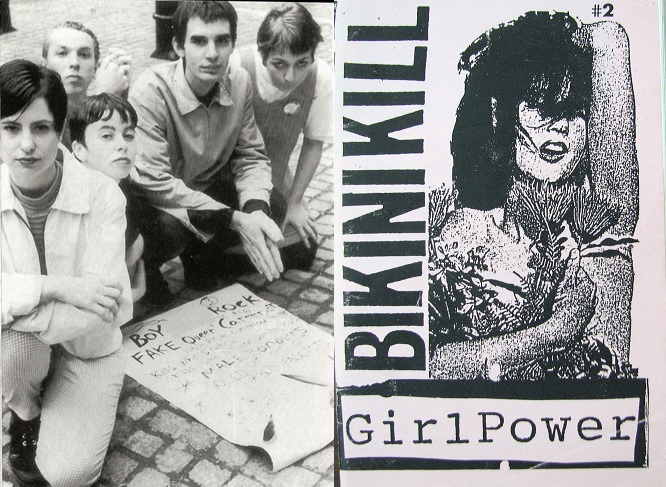
By the 1990s, female artists had become less willing to tolerate such macho behaviour and Riot Grrl, a feminist offshoot of punk, spread to the UK along with Grunge. Brighton band Huggy Bear worked closely with American scene leaders Bikini Kill, releasing a split album “Our Troubled Youth/Yeah Yeah Yeah Yeah,” the names of the Huggy Bear and Bikini Kill sides, respectively. Huggy Bear called themselves “girl-boy revolutionaries”, in reference to their political philosophy and the gender makeup of their band. Flyers were handed out at their gigs asking that men respect women’s right to enjoy themselves at gigs free from harassment, something that Dream Wife are still having to do in 2018.
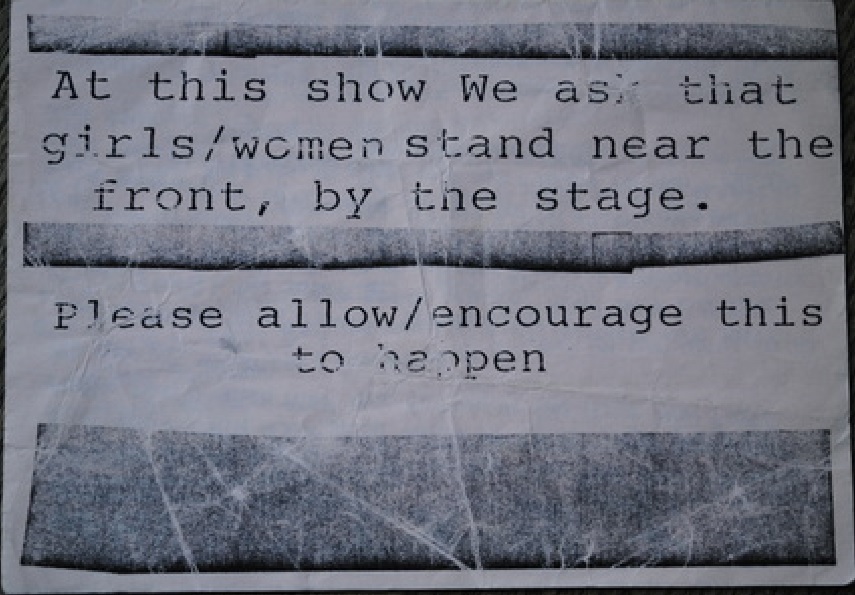
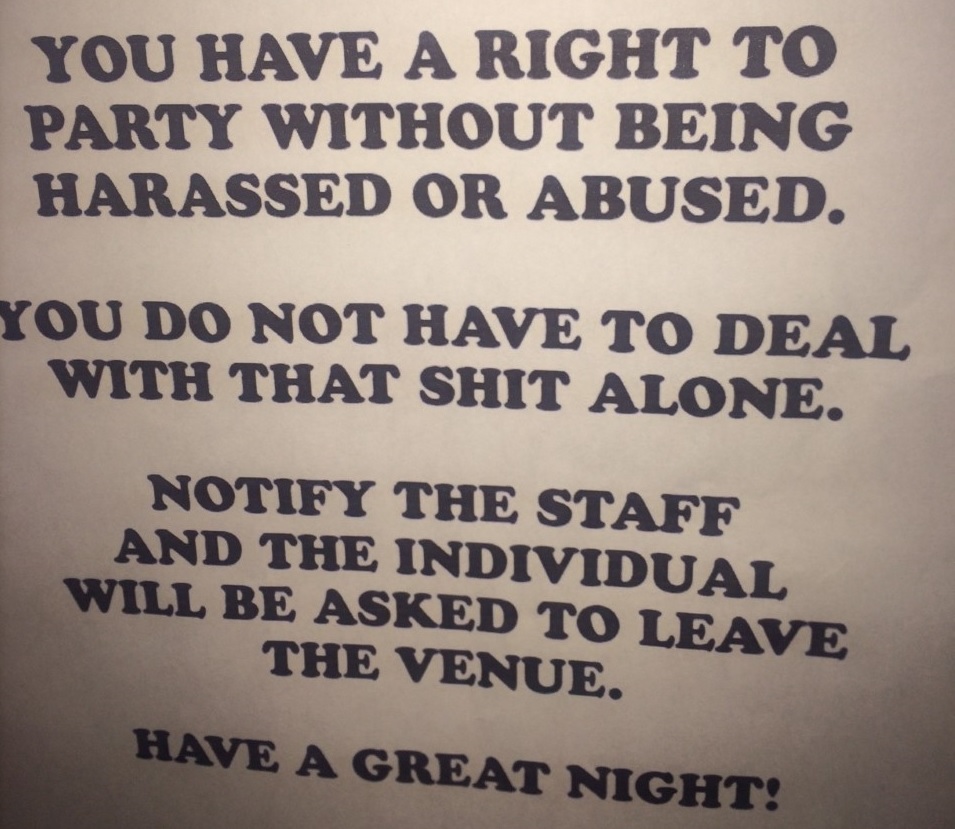
Most notoriously, on 14 February 1993, Huggy Bear performed their single “Her Jazz” on Channel 4’s, ‘The Word’. After their set, the band and their fans started shouting, live on air, at the show’s presenter Terry Christian who had allegedly made patronising comments toward them. They were ejected from the studio, and a spokesperson for ‘The Word’ later claimed that one of the band’s friends had assaulted a member of the production team, which the band denied. The performance and its aftermath gained a Melody Maker cover story, the event being compared to the Sex Pistols’ Bill Grundy incident.
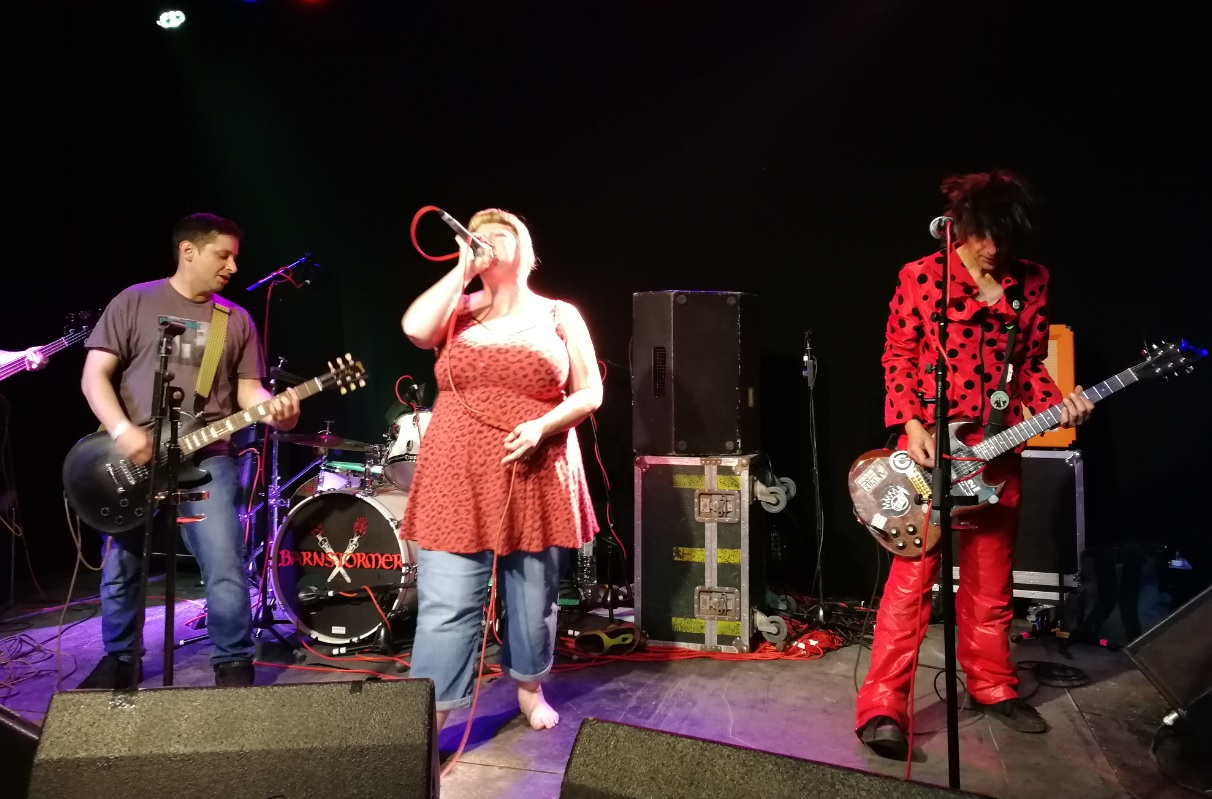
Mel Gordine-Tyler of Combat Shock became involved in the punk scene back in 1993 when she formed the band with her now husband Sonny, with Mel on dual vocals and Sonny on drums. She recalls that “being a woman in punk at that time meant you were sadly more of a minority group, but that did not mean you had a minority input, I was sometimes not taken seriously by the ‘men’ when approaching bands to put gigs on but eventually I proved that it could be done by a woman (who knew!). I shouldn’t have had to, but that’s how it was and is still to some degree…things will change the more we stand up and make ourselves heard for equality and for that I do not stop shouting”.
“Being a woman in a band does not mean you have to take your kit off to gain attention, we can do that on talent and sheer bullheadedness – no woman should ever feel that the only way to get noticed is to take your kit off to gain an audience of drooling men. Other than that, being involved in the punk scene is great fun and I have met some lifelong friends over the years, played many gigs raising money for worthwhile causes and I don’t think it will ever leave me…..as the saying goes once a punk always punk.”
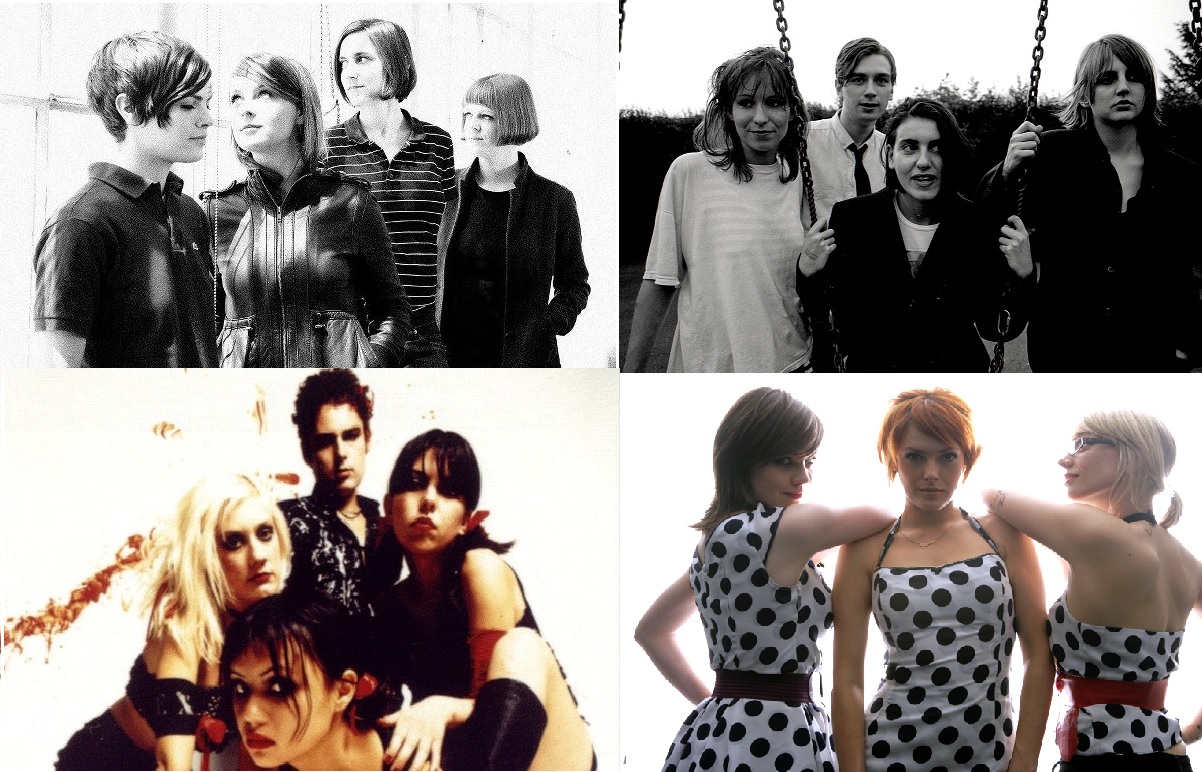
From the late 90s up to the present, the more tolerant atmosphere of Brighton has allowed several female centred Brighton bands to thrive; Electrelane, Elastica, Lolita Storm, The Pipettes and Tampasm, to name but a few, although Tampasm still suffered from record company interference in their image as late as 1998.
We asked a few of today’s local (and further afield) female musicians what it’s like for women in music in 2018.
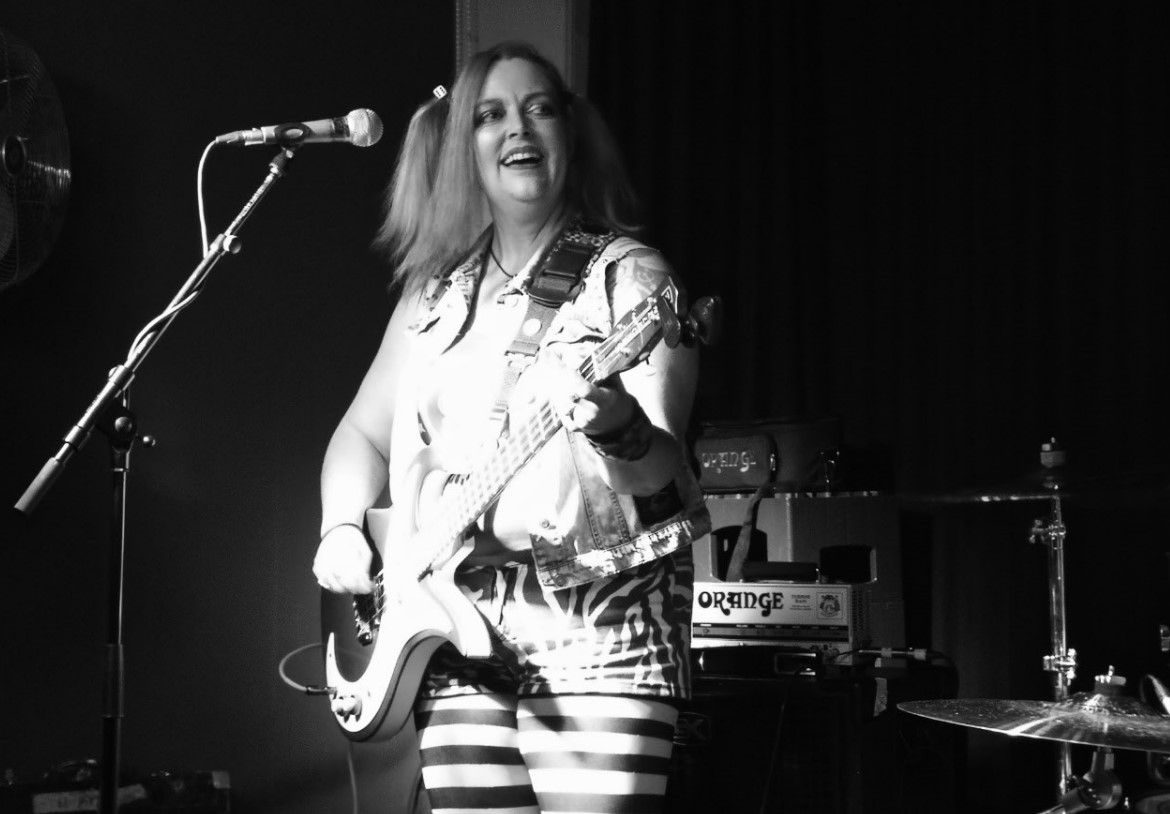
· From Victoria Wren AKA Viki Vortex …..“Women in alternative/punk music tend to be either put on pedestals or ignored – there doesn’t appear to be a healthy balance. Major festivals in Europe feature very few women-led groups which is a shame. There are a lot of super talented women playing guitar, drums, bass, singing, who should be given the opportunity as musicians, not just as ‘female musicians’.”
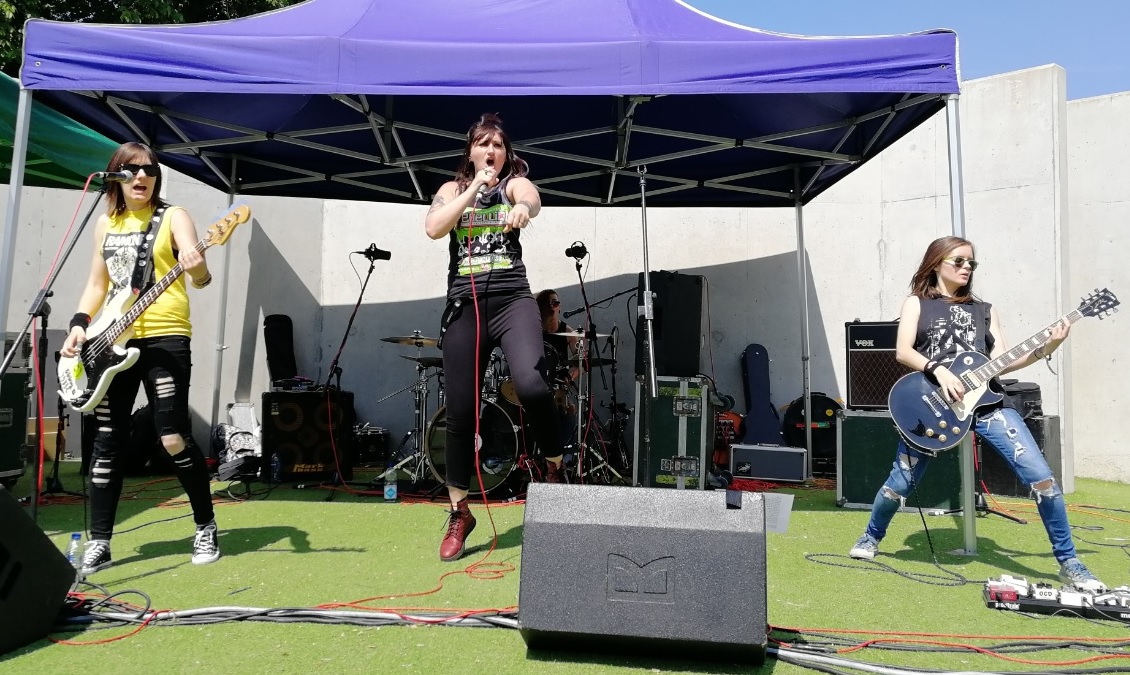
· From The Ramonas….Victoria AKA Pee Pee Ramona – “I think it will always be a novelty to be a girl in a band, whilst the balance is out, but that isn’t necessarily a negative thing. After playing for bands in other areas/genres of the music scene, I would say the punk scene has the least sexism in my experience. It’s great to see plenty of women currently involved in the genre, but it would be nice to see more women represented in the headline festival slots and in other roles like photographers, stage managers etc…..”
Camille AKA Cammy Ramona – “It has to be said that the support of female artists in the punk community is great, and I’m very appreciative of that. However, I think there is still a long way to go in the music scene in general, for women to feel completely equal and to be taken as seriously as men automatically always seem to be. My gender is still always commented on more than my abilities as a performer.”
Lisa AKA Cloey Ramona – “I think that the punk community is so open and supportive that being female hasn’t been an issue on the scene”.
Maxine AKA Rohnny Ramona – “Within the many areas and genres of the music industry, punk is the one of the most encouraging, no matter what your gender identity”.
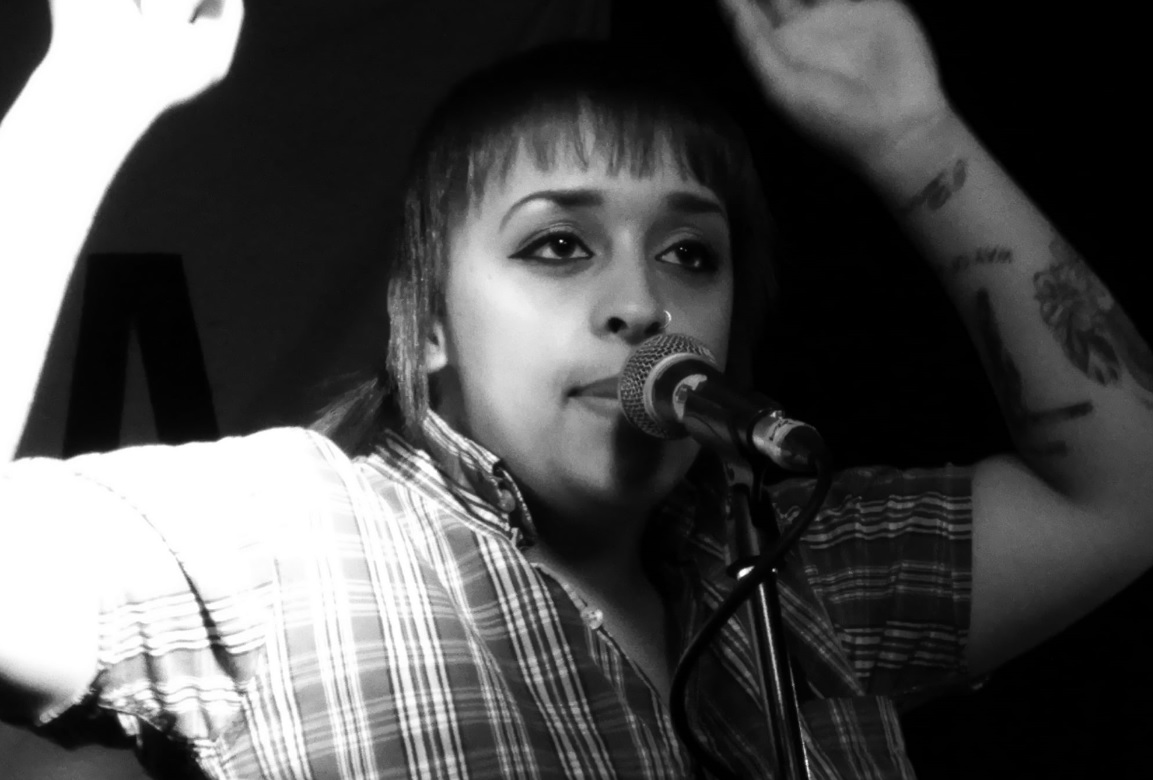
· From Clara Byrne from Dakka Skanks – “Being a Female in the punk scene, I have met a lot of the older generation all over England, from them my understanding is that punk should be freedom of expression, not political labelling. In my opinion, the punk scene in Brighton lacks that raw edge of a punk way of life. but the musicians are great bringing a new modern edge to the punk music scene”.
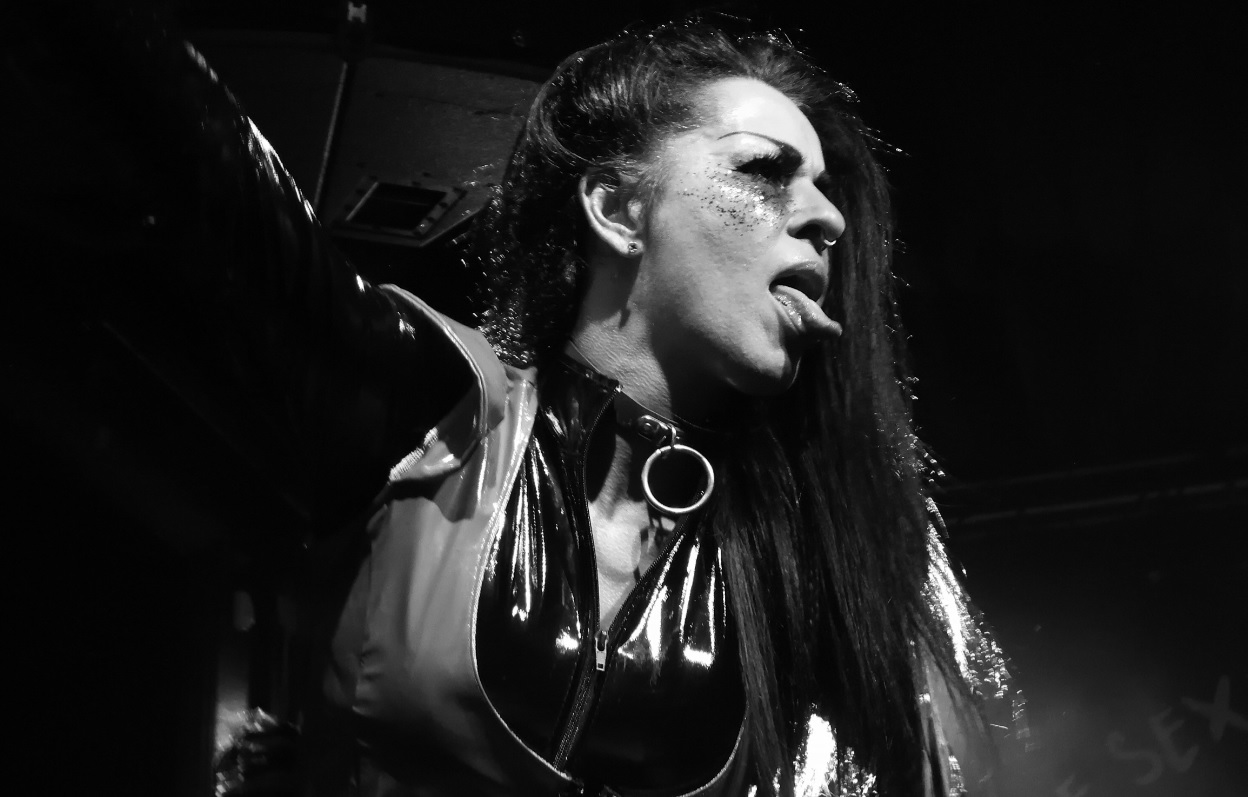
· From Caroline Lowe AKA Nancy Doll from the Sex Pissed Dolls – “We believe more girls should pick up instruments and show the boys we can give them a run for their money”.
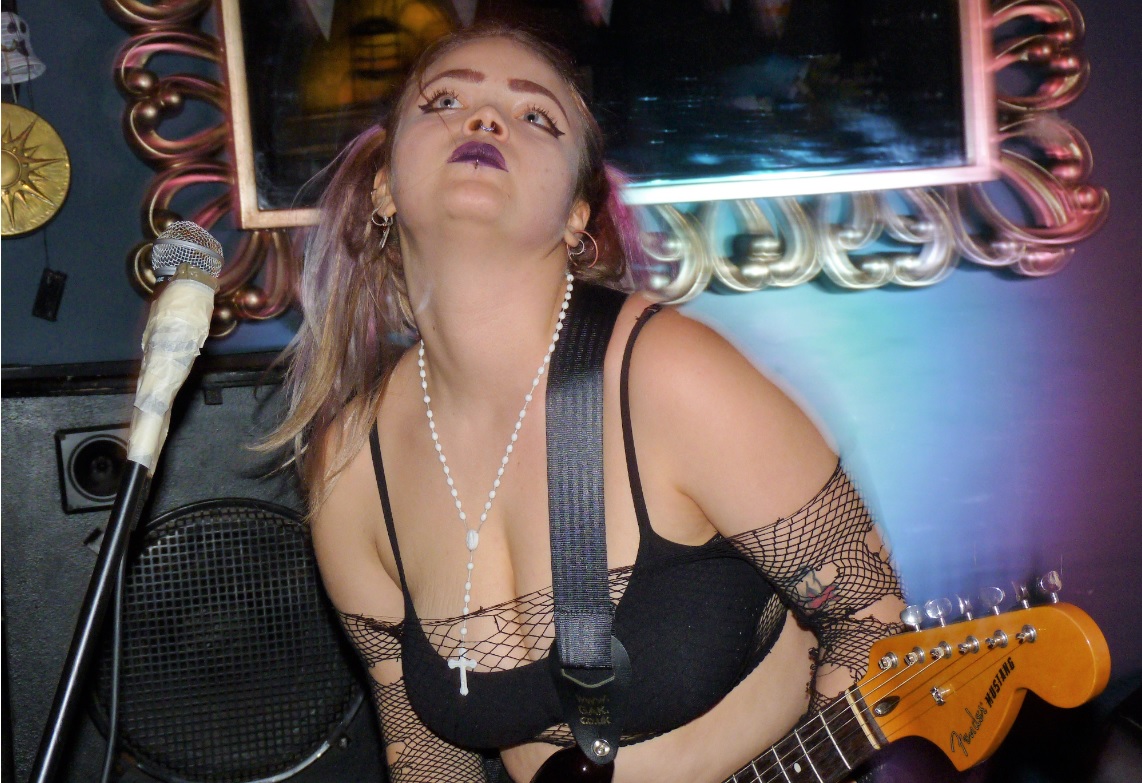
· From Hannah Waterman AKA Hannah Villanueva of Pussyliquor …. “All I wanted was to be a guitarist in a gnarly rock band. And I never saw women doing that. So, as I felt like society around me was pulling the women and men in my life further and further apart from each other, creating a cavernous void of difference, based on what seemed to me to be tactless biological nonsense, I felt so alienated”.
“My parents bought me a guitar for my birthday. I tried to play it but… girls don’t play guitar, right? It sat gathering dust for years, and every time it entered my peripheral it filled me with the sadness and melancholy of the disaccomplish. What could have been my passion and skill became a hunk of wood and wire gone to waste. I didn’t have anyone who told me I was, in fact, capable of making something of it”.
“That is until my mother got out a photo album of pictures she took of bands in the 90s. Bikini Kill, Hole, Huggy Bear, Bratmobile, Elastica. All this time, all these powerful women had been shredding guitar and bashing drum kits and slapping bass right under my nose. Why had they been hidden from me? Why weren’t they on TV? These girls weren’t wimpy. These girls weren’t boring. These girls weren’t supporting characters for men, these girls believed in something. These girls lived life how they wanted to, of their own volition, these girls grabbed life and wrestled its injustices to the ground, and I knew immediately that I would be one of these girls. Without these role models, who just by doing what they wanted, made it plainly obvious to me that I COULD learn guitar and I COULD make music and I COULD get up in front of a crowd, where would I have found the artistic outlet I needed?”
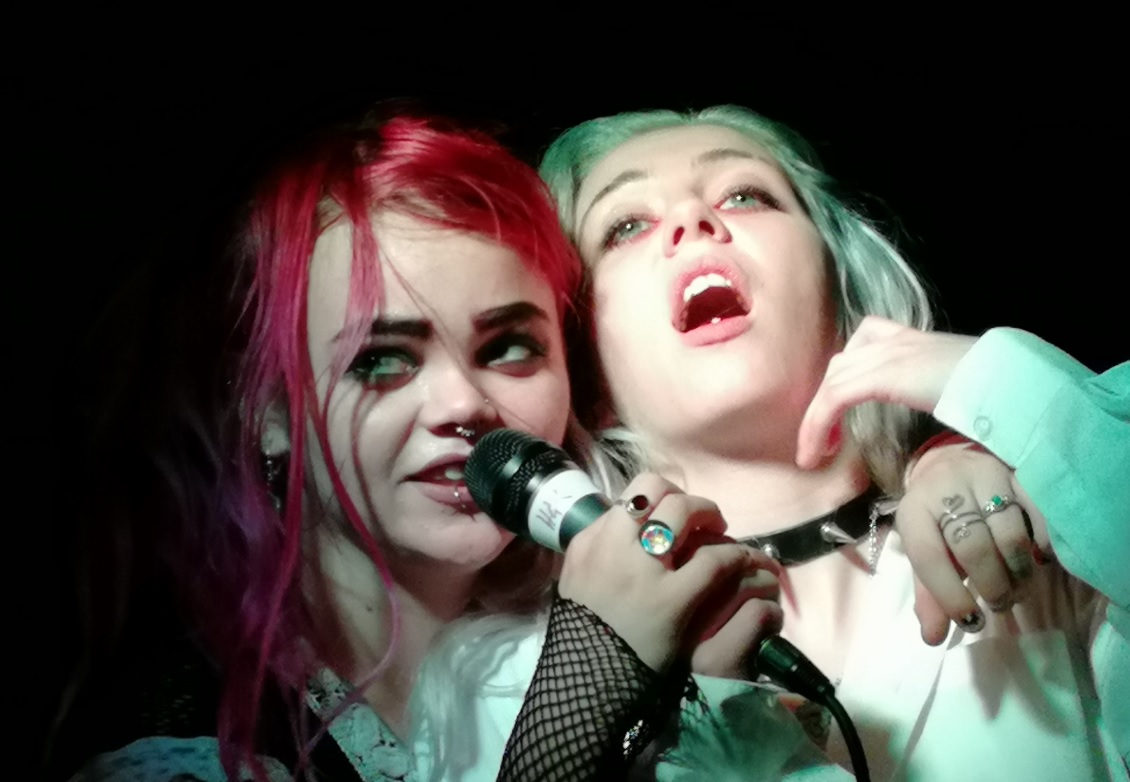
“Music meant the world to me, but I couldn’t have stayed a spectator. It was crushing me to only see women and girls as “fangirls”, groupies and wives of musicians. The girls in the music videos were dancers, or fans, or beautiful, mysterious, nameless faces taking kisses, donning pencil skirts, seducing the frontmen of bands. It took seeing other women who didn’t give a f*ck about these gender roles, to make me realise, I was so much more than a “fangirl”, and to live the life I wanted, I didn’t have to be a groupie or a commodity or a support act to a man. I could be talented and skilled and believe something of my own merit, and it didn’t matter what the world said I should do based on what was between my legs”.
“This doesn’t just apply to music – all these girls growing up in our world are seeing men being talking heads and faces of science, engineering, mathematics, literature, film, music. We are seeing on the news now that as long as you are affluent and male, you can just about get away with treating women however you want – Weinstein, Trump, Saville. You can “grab us by the pussy” or you can label us “whores” in your pop punk songs when we don’t date you. Your art, impact and role in the world will be valued monetarily and culturally over just about any woman in the world, even if you’ve used your position of authority to abuse those around you weaker than yourself. We cannot, as artists, if our art means anything to us spiritually and socially, stand by and allow this to take place without our cultural commentary.”
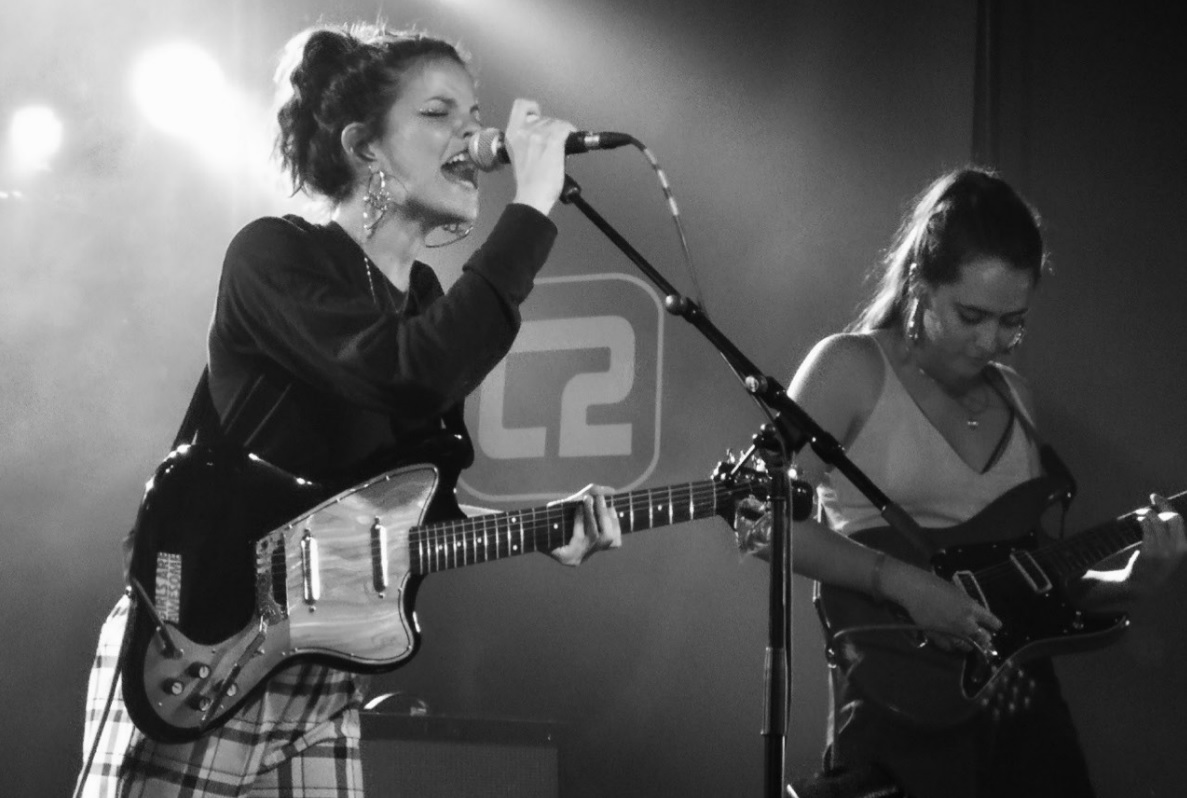
In conclusion whilst women have come a long way in music over the past few years, the fact that this article is being written shows the battle is not yet won. Whilst the fact that half of new musicians are female is a positive sign, there are still obstacles to be overcome. The Fender study also found that most of the guitar purchases by women were made online as they felt “intimidated in “bricks and mortar” guitar shops. The #metoo campaign has yet to impact the music industry for example. Perhaps women musicians will only really have arrived when their gender is no longer remarked upon. No one calls IDLES or Arctic Monkeys an “all boy band,” do they?
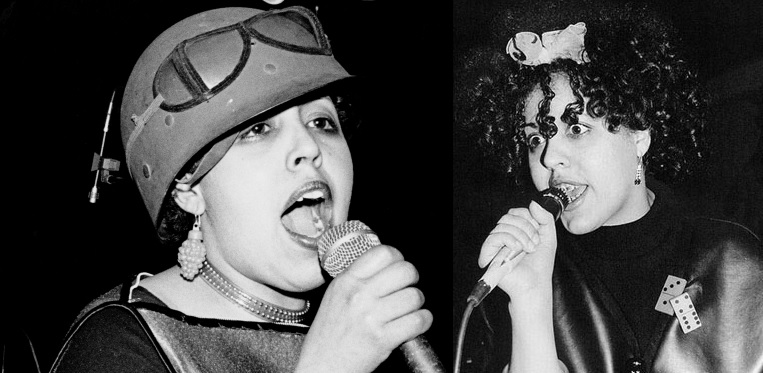
The Brighton & Hove News would like to thank the ladies that have taken the time in putting pen to paper (so to speak) for this special article in order to express their feelings on this relevant and topical subject.







Maid of Ace / Pussy Liquor / Ramonas and many more, excellent bands.